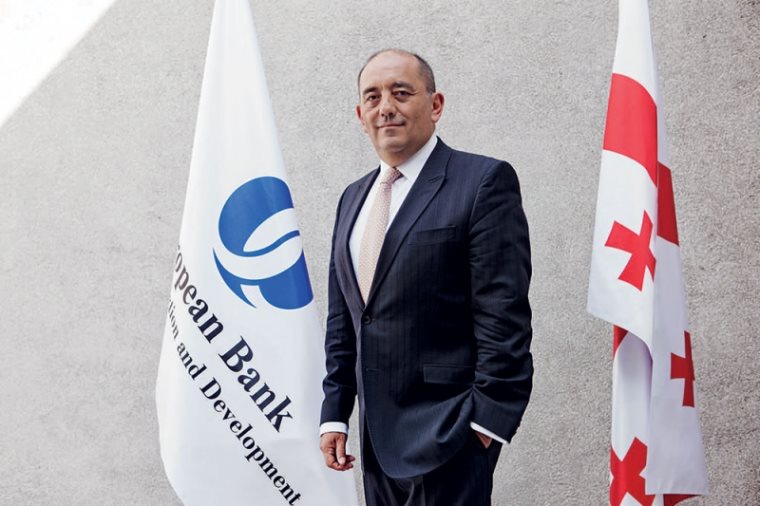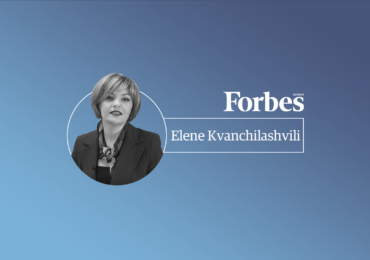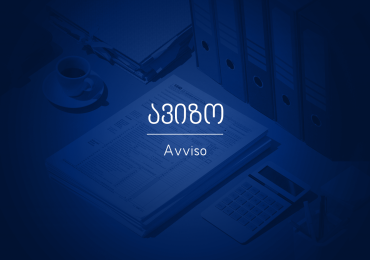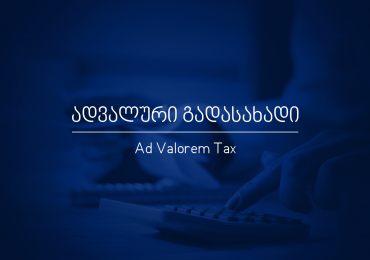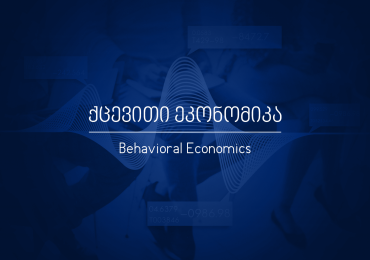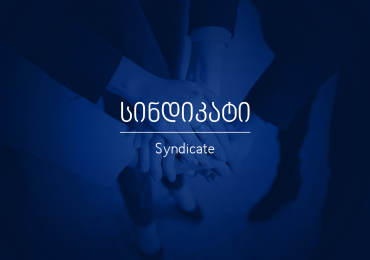25 years, 190 projects, EUR 2.7 billion – the EBRD sets new four-year strategy for Georgia. Bruno Balvanera, Director for Caucasus Moldova and Belarus European Bank for Reconstruction and Development (EBRD) has more to tell.
The EBRD marks the 25th anniversary of its establishment. How would you evaluate the organization’s job done in Georgia and the country’s economic development during the period of the 2.5 decades?
The EBRD was established to help central and Eastern Europe embrace democracy and the market economy. For the last 25 years, the EBRD has been instrumental in helping Georgia grow and transform into a modern country with European values. We continue to stand strong behind Georgia in its efforts to a new and better future.
Georgia has come a long way since the mid-1990s, making remarkable progress in implementing political and structural reforms, tackling corruption and improving transparency. The country’s free and democratic elections serve as an example, as does its track record in structural changes and the reform process. Signing the Association Agreement and the Deep and Comprehensive Free Trade Area DCFTA with the European Union (EU) last year marks another step towards integration and successful development.
Over the last 25 years EBRD helped Georgia to identify and overcome legal impediments to investments through our Legal Transition Programmes. Our Team is currently supporting the creation of appropriate legal framework for various forms of private public partnerships for the development of large infrastructure projects whether ports, roads or others which we will consider financing. Due to its favorable location, at the crossroads of western Asia and eastern Europe, bordering with Armenia, Azerbaijan, Russia and Turkey with access to the sea, Georgia’s infrastructure has to be reliable, well developed and sustainable for the country to be a key player in the global trade and regional connectivity.
How satisfactory is the EBRD story in Georgia summed up in numbers?
Since the start of operations in Georgia in 1992 EBRD has invested in 190 projects with cumulative investments reaching EUR 2.6 billion-an impressive figure for a country of just under 5 million people. Half of our portfolio is in the energy sector, followed by the financial sector with over one-third, the corporate sector at 18 per cent and infrastructure sector accounting for 3 per cent. All our achievements are only made possible because of our talented team of people. Our commitment and energy is key to the EBRD’s continued success.
Devaluation of the local currency has been (and still remains) one of the major issues in 2015. How active has the EBRD been in helping Georgia settle this and other ongoing problems?
2015 was a very successful year for the EBRD in Georgia, with total investments reaching $ 150 million over 16 projects. A large share of our activities was concentrated in the manufacturing and services sector with investments in the healthcare system, industry, and property and tourism.
Over the past few years, we have been actively engaged in promoting local currency lending and supporting the de-dollarisation of the Georgian banking system and economy. In early 2014, we were the first international financial institution to issue a bond in Georgian lari, which was followed by a second lari bond this year. This was a very important step to strengthen the local currency, increase confidence in the local market, diversify sources of funding and develop the local capital market.
Our investments have focused on strengthening the private sector, with particular attention to micro, small and medium-sized enterprises (MSMEs); supporting the de-dollarisation of the financial system by using local currency (as mentioned above), as well as continuing to develop local capital markets; modernizing the energy sector with hydro power generation; and promoting Georgia’s regional and global economic integration. The EBRD is also in full agreement with the government’s priority to make growth more socially inclusive by, for example, improving the quality of municipal services in lesser developed regions of Georgia.
The EBRD was instrumental in assisting Georgia in becoming an electricity exporting country. Why energy sector?
The EBRD is one of the largest renewable energy investors in Georgia. 50% of our portfolio is in the Power & Energy sector. Renewable energy strengthens energy security of the country. It also flows across borders, helping out energy-hungry neighbors.
While Georgia has no oil and gas resources, it is blessed with high mountains, rivers, wind and sunshine – all of which are abundant sources of renewable energy. Over the years, we have financed several strategic projects in the energy sector such as the rehabilitation of the Enghuri hydro power plant (HPP) that supplies 40 per cent of Georgia’s energy, the first private hydro power plant Paravani and – most importantly – the Black Sea Transmission Line that is critical for integrating Georgia into the regional markets by connecting local energy producers with potential export markets.
The EBRD also financed the construction of two hydro power plants, the Dariali HPP and the Shuakhevi HPP, which will supply electricity to the Georgian and Turkish grid via the Black Sea Transmission Line. This will play a key role in the development of Georgia’s hydropower resources while helping it to improve its energy security. At the beginning of 2016 the Bank signed the Gori Wind farm project, its first wind farm project in the southern Caucasus, which will help to generate 20 MW of electricity.
One other example, a completed project – but still important and strategic for the country – is the Baku-Tbilisi-Ceyhan (BTC) pipeline and that facilitated oil and gas supplies from Azerbaijan to Georgia.
The EBRD has played a significant role in Georgia’s private sector development. How do assist both large companies and SMEs?
For the EBRD, fostering private investment development is of paramount importance. 18% of our portfolio is invested in direct support to the corporate sector in Georgia ranging from light and heavy industry, commerce, agribusiness, manufacturing and services, to property and tourism etc. A sound private sector is the backbone of any wellfunctioning and sustainable economy. We support private businesses directly and through our local partner banks. Small and medium-sized enterprises (SMEs) in Georgia need a special boost, support and good access to finance.
The EBRD is also making additional efforts with SMEs that have high growth potential. Through our specially designed programmes, financed by the European Union and run by the Bank’s Small Business Support team, we help to connect our clients with local consultants and international advisers who can help transform their businesses. From the smallest company to bigger enterprises hoping to go global, our expert network can help clients to achieve success.
EBRD aims to continue supporting Georgia to implement its commitments under the DCFTA, by helping businesses to improve quality standards and enhance value-added, including through the introduction of new technologies and processes.
How big is the progress in financial sector in particular?
A sound and resilient financial sector is the bloodstream of every healthy economy. 30% of our portfolio Georgia is in the financial sector. Throughout all these years EBRD has played a leading role in helping Georgia’s financial sector develop and grow to its current solid stage. In the aftermath of the 2008 financial crisis, the EBRD was strongly engaged and committed to strengthen the sector and keep credit to businesses flowing. This successful development is best reflected in the fact that two of our local partners – Bank of Georgia and TBC Bank – are now listed on the London Stock Exchange.
Through the banking sector we continue to support the corporate sector via our numerous credit lines: Georgian Agribusiness Financing Facility (GAFF), Small and Medium Enterprise (SMEs) finance; Energy Efficiency credit lines to corporate and residential clients; Trade Facilitation Programme (TFP), Women in Business (WiB) credit lines etc.
We invest in changing lives – working together with the private sector, we invest in projects, engage in policy dialogue and provide technical advice that fosters innovation and builds sustainable and open market-oriented environment. For 25 years the EBRD has used investments, technical advice and policy dialogue to improve peoples’ lives.
The EBRD’s Annual Meeting and Business Forum that took place last year was attended by more than 2,500 guests, bringing together government, business, media and civil society representatives from more than 60 countries. Would you say the event has put Georgia on the map of global investors?
It provided an excellent opportunity for participants to gain further insight into the economic climate of the region, especially with regard to investment opportunities in Georgia, and to discuss important economic and investment issues affecting the EBRD’s countries of operations. Winning the attention of the international media for three days offered a unique opportunity for Georgia to promote itself as an attractive business destination and key position as a regional hub.
Without a doubt, the EBRD’s Annual Meeting helped to boost local tourism with hotels and restaurants in Tbilisi benefiting from the large number of foreign guests. It allowed many local companies to be contracted to lead all the works, supply equipment, provide catering and many other services.
In 2015 the EBRD joined forces with the Georgian government and formed an Investors Council. What are the goals of the council?
Investors Council is aimed to be a dialogue platform between the private and public sector, focusing on practical steps to increase and attract domestic and foreign investments and enhance predictability, clarity, visibility and confidence. The initiative has already been very successful in addressing various issues affecting the business environment such as tax reforms, public disclosure mechanism and insolvency laws.
In addition, the council will assist further improvements of corporate governance structures, bringing them closer to European standards. This is especially important after the recent signing of the EU Association Agreement. This is a key initiative and I am very happy to see that it has the support and the endorsement of the Prime Minister of Georgia and his government as well as of the business community. The initiative has already been very successful in addressing various issues affecting the business environment such as tax reforms, public disclosure mechanism and insolvency laws.
The EBRD is owned by 65 countries, the European Union and the European Investment Bank. Each shareholder is represented on the Board of Governors, which has overall authority over the EBRD. Under the guidance of the Board of Directors, the President manages the EBRD’s work.
Since its establishment in 1991 the EBRD has become the largest financial investor in a region that stretches from central Europe and the Western Balkans to Central Asia. In 2011 the organization started expanding its operations in the southern and eastern Mediterranean (SEMED) region. The EBRD currently works in 36 countries.
INTERVIEW IN GEORGIAN.
დატოვე კომენტარი

